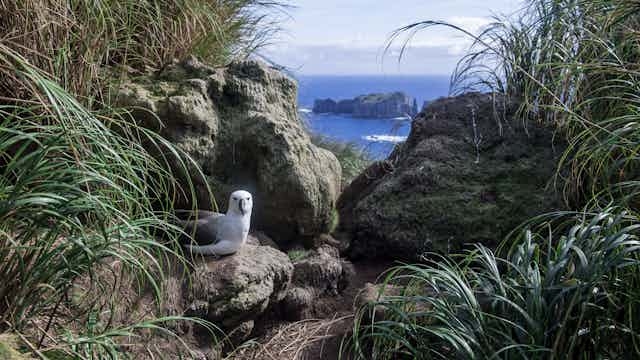The UK overseas territory of Tristan da Cunha is the most isolated place on Earth. Despite the tiny population and secluded location of these four South Atlantic islands – which lie 2,432kms (1,511 miles) west of Cape Town, South Africa – 90% of Tristan’s waters recently became the newest piece in the UK government’s Blue Belt programme.
The Blue Belt brings together half of the UK’s 14 overseas territories – vestiges of the country’s colonial past – in the world’s largest enclosure for marine protection. This network of marine protected areas (known as MPAs, for short) stretches over 4.3 million square kilometres of ocean and accommodates over 90% of UK biodiversity. According to the UK prime minister, Boris Johnson, the Blue Belt helps protect the world’s oceans from global warming, plastic pollution and ocean acidification. It also helps the UK government act as a global leader in meeting the UN target for protecting 30% of the ocean by 2030.
Such enclosures in remote waters can do very little on their own to mitigate climate change and plastic pollution. But Tristan’s land and marine environment is already highly protected. The territory hosts a thriving community of unique wildlife, a UNESCO world heritage site and two wetland habitats of international importance. There’s no airport or heavy industry, just a small dock and a lobster processing plant that provides most of the islanders with a steady income. With a permanent population of only 240 people, these rocky islands nearly 10,000 kilometres from the UK are one of the few remaining places where travel times from the rest of the world can be measured in days, and sometimes weeks (weather depending), instead of hours.
Beneath the surface
The UK government’s commitment to protect vast swaths of the South Atlantic comes a month after revelations that seas closer to home lack basic restrictions on fishing. Despite official protection, 97% of MPAs off the UK coast are subject to the most destructive forms of trawling.
Like many overseas territories, Tristan da Cunha relies heavily on UK aid. But the UK government is investing in tourism infrastructure for Blue Belt territories, including a £285 million (US$379 million) airport, a luxury hotel and a resort and golf complex on St Helena, Tristan’s closest island neighbour, 2,161 kilometres (1,343 miles) to the north. According to a recent report from the Foreign Affairs Committee the goal is to phase out support for day-to-day spending from the UK Treasury, requiring the islands to develop international tourism and fishing to meet the income shortfall.

The aviation sector emitted more than 900 million tonnes of CO₂ in 2018. This figure is expected to triple by 2050. Increasing the number of flights to remote places will only accelerate this trend.
Tourism does not automatically protect local biodiversity either. Research has suggested that instead of raising awareness and providing a stake for local people in conservation efforts, close encounters between tourists and endangered species can actually increase the likelihood of environmental crimes such as poaching.
Ulterior motives
Environmental concerns in the territories have provided cover for geopolitical interests in the past. In 2010, the UK’s then foreign secretary David Miliband approved a 640,000 square kilometre “no-take” MPA around the Chagos Islands. While the move suited the UK and US, which operate a military base there, many exiled Chagossians see it as another attempt to prevent their return.
Despite their fragile ecosystems, the most politically sensitive and populous territories (the Falklands and Caribbean islands for example) have been omitted from the Blue Belt. New MPAs appear to be earmarked for territories more dependent on UK aid. If these territories do grow their economies through tourism or fishing, some will no longer qualify for Official Development Assistance, but will probably be too poor to manage without it.

A different approach
Blue belt territories shouldn’t face a choice between poverty or environmentally ruinous growth. A conservation basic income – a universal payment to all residents, provided by the UK Treasury – could acknowledge the work of islanders in conserving the global oceans. In covering their material needs, it would prevent people having to turn to activities that harm the environment, such as unsustainable fishing.
The UK’s investments in St Helena betray a tourism model based on fish guzzling, sprawling luxury and rapid visitor turnover. But studies have shown this approach more often harms ecosystems and increases deprivation in host communities. A slower kind of tourism, which swaps fast planes for slow boats and luxury resorts for family guesthouses would be a better strategy.
Britain’s exit from the EU will entail radical changes in its fishing arrangements, perhaps increasing pressure on territorial waters overseas. Casting nets away from the EU and towards isolated islands might prove politically uncomplicated in the UK, but it will significantly affect citizens of those territories who were denied a vote on Brexit.
With a different approach, the Blue Belt could be an ideal opportunity to heal colonial scars, build resilient communities and, in some cases, compensate local people for maintaining these pristine islands for the UK’s benefit.

